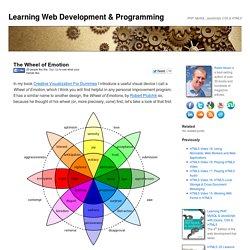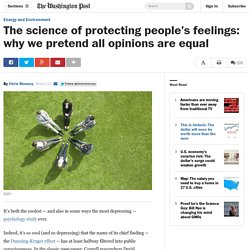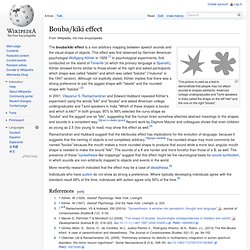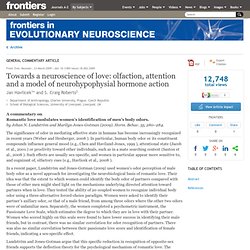

Learning Web Development & Programming. In my book Creative Visualization For Dummies I introduce a useful visual device I call a Wheel of Emotion, which I think you will find helpful in any personal improvement program.

It has a similar name to another design, the Wheel of Emotions, by Robert Plutchik so, because he thought of his wheel (or, more precisely, cone) first, let’s take a look at that first: Plutchik’s Wheel of Emotions With this diagram Plutchik demonstrates a selection of major human emotions, how they are related to each other, and how they are different too (or bipolar as he calls the emotions at opposite sides). At the center of this wheel there are eight basic emotions (as he refers to them) such as ecstacy and grief. Then each of these is connected to two more subtle emotions that lead to what Plutchik calls the eight advanced emotions – those around the outside. My Wheel of Emotion. 5 Weird Ways Cold Weather Affects Your Psyche. Freezing temperatures and snow have turned much of the United States into an icebox.

But, beyond keeping people inside and prompting them to bundle up when they venture out, does the cold weather change people's behavior? Science says yes. Cold temperatures can influence our thoughts and decisions without our even knowing it, experts have found. The New Rules of Social-Media Etiquette. Where are you the funniest, smartest, most Facetuned version of yourself?

This week, the Cut explores the complexities, vanities, and pitfalls of self-presentation online. Social media as it’s now understood has existed for less than a decade. (Facebook only opened itself to the general public in 2006.) 7 Habits Of Exceptionally Resilient People. 10 Simple Truths Smart People Forget. Email Some of the smartest people I know continuously struggle to get ahead because they forget to address a few simple truths that collectively govern our potential to make progress.

So here’s a quick reminder: #1 – Education and intelligence accomplish nothing without action. Spotting Emotional Manipulation. Www.washingtonpost. It’s both the coolest — and also in some ways the most depressing — psychology study ever.

Indeed, it’s so cool (and so depressing) that the name of its chief finding — the Dunning-Kruger effect — has at least halfway filtered into public consciousness. In the classic 1999 paper, Cornell researchers David Dunning and Justin Kruger found that the less competent people were in three domains — humor, logic, and grammar — the less likely they were to be able to recognize that. Or as the researchers put it: We propose that those with limited knowledge in a domain suffer from a dual burden: Not only do they reach mistaken conclusions and make regrettable errors, but their incompetence robs them of the ability to realize it. Dunning and Kruger didn’t directly apply this insight to our debates about science.
So why do I bring this classic study up now? Learned Helplessness. The Misconception: If you are in a bad situation, you will do whatever you can do to escape it.

The Truth: If you feel like you aren’t in control of your destiny, you will give up and accept whatever situation you are in. In 1965, a scientist named Martin Seligman started shocking dogs. He was trying to expand on the research of Pavlov – the guy who could make dogs salivate when they heard a bell ring. Seligman wanted to head in the other direction, and when he rang his bell instead of providing food he zapped them with electricity. Alison on Behance. When my daughter Alison was born, in the tradition of a new parent, I began to photograph her, initially in a separate and private body of work.

However, in the process of documenting Alison's growth, I developed a passionate interest in human relationships and capturing intimate moments in the lives of family and friends. Just Like People: Drunk Monkeys in St Kitts - Weird Nature. 10 Psychological States You've Never Heard Of... and When You Experienced Them. Hidden persuaders. Bouba/kiki effect. This picture is used as a test to demonstrate that people may not attach sounds to shapes arbitrarily: American college undergraduates and Tamil speakers in India called the shape on the left "kiki" and the one on the right "bouba".

The bouba/kiki effect is a non-arbitrary mapping between speech sounds and the visual shape of objects. This effect was first observed by German-American psychologist Wolfgang Köhler in 1929.[1] In psychological experiments, first conducted on the island of Tenerife (in which the primary language is Spanish), Köhler showed forms similar to those shown at the right and asked participants which shape was called "takete" and which was called "baluba" ("maluma" in the 1947 version). Four is the 'magic' number. According to psychological lore, when it comes to items of information the mind can cope with before confusion sets in, the "magic" number is seven.

But a new analysis by a leading Australian psychiatrist challenges this long-held view, suggesting the number might actually be four. In 1956, American psychologist George Miller published a paper in the influential journal Psychological Review arguing the mind could cope with a maximum of only seven chunks of information. The paper, "The Magical Number Seven, Plus or Minus Two. Some Limits on Our Capacity for Processing Information," has since become one of the most highly cited psychology articles and has been judged by the Psychological Review as its most influential paper of all time.
But UNSW professor of psychiatry Gordon Parker says a re-analysis of the experiments used by Miller shows he missed the correct number by a wide mark. The full discussion paper includes many exemplars of the magic of 'four'. Towards a neuroscience of love: olfaction, attention and a model of neurohypophysial hormone action. A commentary onRomantic love modulates women’s identification of men’s body odors.by Johan N.

Lundström and Marilyn Jones-Gotman (2009). Horm. Behav. 55, 280–284. The significance of odor in mediating affective state in humans has become increasingly recognized in recent years (Weber and Heuberger, 2008 ). In particular, human body odor or its constituent compounds influence general mood (e.g., Chen and Haviland-Jones, 1999 ), attentional state (Jacob et al., 2001 ) or proclivity toward other individuals, such as in a mate searching context (Saxton et al., 2008 ). In a recent paper, Lundström and Jones-Gotman (2009) used women’s odor perception of male body odor as a novel approach for investigating the neurobiological basis of romantic love. Upper-Class People Have Trouble Recognizing Others’ Emotions.
News Upper-class people have more educational opportunities, greater financial security, and better job prospects than people from lower social classes, but that doesn’t mean they’re more skilled at everything. A new study published in Psychological Science, a journal of the Association for Psychological Science, finds surprisingly, that lower-class people are better at reading the emotions of others. The researchers were inspired by observing that, for lower-class people, success depends more on how much they can rely on other individuals. For example, if you can’t afford to buy support services, such as daycare service for your children, you have to rely on your neighbors or relatives to watch the kids while you attend classes or run errands, says Michael W. Kraus of the University of California-San Francisco. One experiment used volunteers who worked at a university. Untitled Document. The Problem of Perception.
First published Tue Mar 8, 2005; substantive revision Fri Feb 4, 2011 Sense-perception—the awareness or apprehension of things by sight, hearing, touch, smell and taste—has long been a preoccupation of philosophers. One pervasive and traditional problem, sometimes called “the problem of perception”, is created by the phenomena of perceptual illusion and hallucination: if these kinds of error are possible, how can perception be what it intuitively seems to be, a direct and immediate access to reality?
The present entry is about how these possibilities of error challenge the intelligibility of the phenomenon of perception, and how the major theories of perception in the last century are best understood as responses to this challenge. Study: When resources are scarce, most people forfeit the future. Poor people are often criticized for self-defeating behaviors, from taking out high-interest payday loans as a way of getting through the week, to not putting aside money for the future. But a new study published today in Science magazine suggests that most of us are likely to behave that way when we are faced with a shortage of resources.
Experiments put college students in "rich" and "poor" groups as they played a series of games. Students in the "poor" groups were given less time or fewer chances to win at the games than those in the "rich" groups. The result? "Poor" students focused much more intensely on the immediate task at hand, and they were more likely to take out "loans" of time or chances to keep playing a game, even though it depleted their resources for future rounds. Top 20 Movies for Philosophy Students.